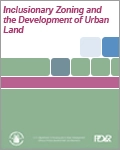Inclusionary zoning is a set of controls and incentives designed to encourage the production of affordable housing. In this paper, the author presents a dynamic model of developer behavior and examines how a developer would respond to the variety of incentives provided by inclusionary zoning. By aggregating the profit-maximizing actions of developers they predict how inclusionary zoning could affect market-level variables such as the housing supply and average rent. They also predict how inclusionary zoning could affect urban aggregates such as the urban-rural boundary and density.



